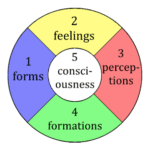
Meditation before sleep is a bit tricky. Meditation is about being more wakeful, but less agitated.
I find that meditation before sleep just a few minutes, can be very relaxing, if I use the correct form. I advise using yoga nidra, self-guided, or box breathing. Simple longer outbreaths with gentle focus are very helpful, too. I recommend against visualizations as these can over-energize us.
I also at times do periods of dream yoga or sleep yoga. Check here if you are having trouble from falling asleep while meditating.
Secrets of Meditation for Anxiety
Like millions of people, you may have suffered from anxiety for years. Meditation, yoga, peaceful music – it never works. It takes too long, and it’s not stable. Why? Because peace is treated as a cause for freedom, but it’s not – it’s the result. The cause to free yourself from anxiety is completely different.
Click now to Overcome Anxiety for good.
Table of Contents
1. Introduction: The Struggles of Sleep
We’ve all been there – staring at the ceiling, counting sheep that stubbornly refuse to jump over the fence, willing ourselves to drift off but our minds are stuck on a hamster wheel of worries. Trouble sleeping is a universal struggle, affecting millions of people around the world. The constant tossing and turning not only disrupts our sleep, but leaves us feeling drained and foggy the next day. Lack of sleep can take a toll on our physical and mental health, impacting our focus, mood, and overall well-being.
But what if there was a natural and effective way to combat these sleep struggles? Enter meditation, an ancient practice that can be your secret weapon for unlocking a good night’s rest.
2. Meditation before sleep: Why It Works
Imagine a world where your mind quiets down as easily as a light switch being flicked off. That’s the magic of meditation before sleep. Here’s the science behind it: when we’re stressed or anxious, our bodies produce cortisol, a hormone that keeps us alert and awake. Meditation acts as a natural stress reliever, calming the mind and lowering cortisol levels. This creates a physiological shift, promoting relaxation and preparing your body for sleep.
But it’s not just about calming the body. Meditation also cultivates mindfulness, that ability to be present in the moment without judgment. By focusing on your breath or a mantra, you learn to detach from the worries and anxieties that often keep us awake at night. The constant mental chatter quiets down, allowing us to drift off to sleep peacefully.
Studies have shown that regular meditation practice leads to improved sleep quality. People who try Meditation before sleep tend to fall asleep faster, experience deeper sleep cycles, and wake up feeling more refreshed and rejuvenated.
How to meditate like a yogi
and enter profound samadhi
3. Getting Started: Simple Techniques for Meditation before sleep
Meditation before sleep might seem intimidating for beginners, conjuring up images of yogis sitting pretzel-legged for hours on end. But the beauty of meditating before sleep is that it can be as simple and accessible as you want it to be. Here are a few beginner-friendly techniques to get you started:
- Body Scan Meditation: Instead of counting sheep, try taking a mindful journey through your body. Close your eyes and focus your attention on your toes, noticing any sensations without judgment. Slowly scan your body upwards, feeling the rise and fall of your breath in your chest, the weight of your head on the pillow. This practice not only relaxes your body but also brings your awareness to the present moment, easing you into sleep.
- Breath Awareness–Meditation before sleep: This technique is as simple as it sounds. Find a comfortable position, sitting or lying down, and close your eyes. Focus your attention on your natural breath, feeling the cool air enter your nostrils as you inhale and the warm air leave as you exhale. If your mind wanders (and it will!), gently guide your attention back to your breath without judgment. Focusing on the rhythm of your breath is a powerful way to anchor yourself in the present and quiet a busy mind.
- Mantra Meditation: Mantras are calming words or phrases silently repeated during meditation. A simple mantra like “om” or “peace” can be a helpful tool to focus your attention and quiet mental chatter. Repeat your chosen mantra silently with each breath, allowing it to wash away worries and lull you towards sleep.
Remember, the key is to find a technique that feels comfortable and natural for you. Experiment and see what works best!
4. Creating a Relaxing Meditation before sleep Routine
Think of your pre-sleep routine as a nightly ritual that sends a clear message to your body: it’s time to wind down and prepare for sleep. Ideally, start incorporating your meditation practice about 15-30 minutes before bedtime. This buffer zone allows you to gently transition from the activities of your day into a relaxed state for sleep.
Here are some tips for creating a relaxing pre-sleep routine:
- Dim the Lights: Our bodies are naturally wired to respond to light cues. Dimming the lights in your bedroom an hour before bed helps signal to your body that it’s time to produce melatonin, the sleep hormone.
- Take a Warm Bath: Soaking in a warm bath can be a wonderfully relaxing way to unwind before bed. The warm water soothes your muscles and calms your nervous system, preparing you for a good night’s sleep.
- Avoid Screen Time: The blue light emitted from electronic devices like phones and laptops can disrupt your sleep cycle. Put away your screens at least an hour before bed to allow your body to wind down naturally.
By incorporating these elements alongside your pre-sleep meditation, you’re creating a powerful sleep sanctuary that promotes relaxation and prepares you for a restful night’s sleep.



5. meditating before sleep: Tips for Consistency
Building a consistent meditation habit, like any new skill, takes practice and patience. There will be nights when your mind seems like a runaway train, filled with thoughts and worries. Don’t get discouraged! Here are some tips to help you overcome challenges and stay consistent with your pre-sleep meditation:
- Start Small: Don’t overwhelm yourself by trying to meditate for an hour right off the bat. Begin with short sessions of 5-10 minutes and gradually increase the duration as you become more comfortable.
- Be Kind to Yourself: It’s normal for your mind to wander during meditation. Don’t beat yourself up – simply acknowledge the wandering thought and gently guide your attention back to your breath or mantra.
- Focus on the Positive: As you develop your meditation practice, take note of the positive changes you experience. Are you falling asleep faster? Waking up feeling more refreshed? Focusing on these improvements can motivate you to keep going.
Remember, consistency is key. The more you practice Meditation before sleep, the more naturally it will become part of your bedtime routine.
6. Conclusion: A Journey Towards Restful Sleep
Meditation isn’t a magic bullet, but it’s a powerful tool you can add to your sleep hygiene toolbox. By incorporating pre-sleep meditation into your nightly routine, you can quiet your mind, reduce stress, and create the ideal conditions for a good night’s rest. The more you practice, the more you’ll experience the benefits of meditation, not just for sleep, but for your overall well-being.
So why not give it a try? As you embark on this journey towards restful sleep, remember to be patient, kind to yourself, and celebrate the progress you make along the way. With a little practice, meditation can unlock the door to a world of peaceful nights and a more mindful, well-rested you.

May all beings be happy
May all beings be peaceful
May all beings be safe
May all beings awaken to the light of their true nature
May all beings be free







